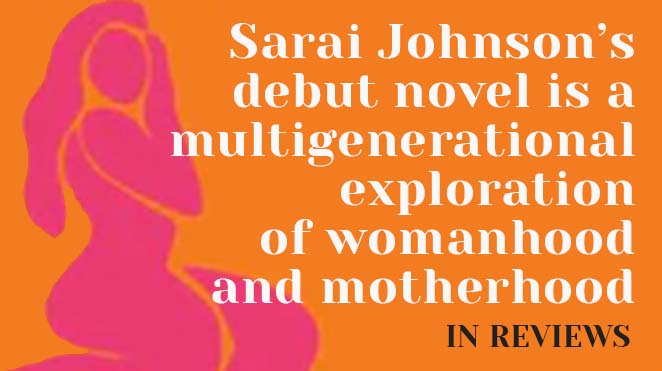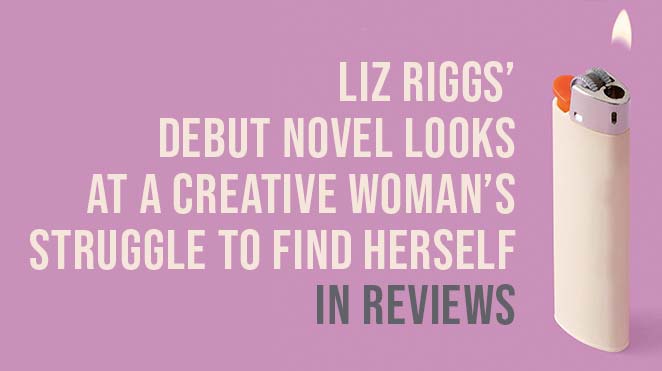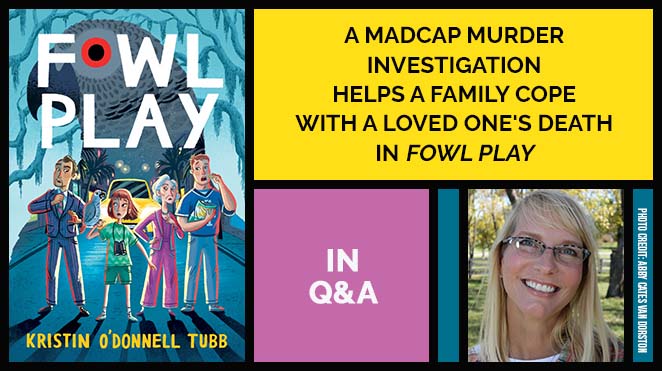In Afterlife, the latest novel by Julia Alvarez, the recently widowed protagonist Antonia Vega finds herself unmoored and alone, forced to figure out her way in the world after the sudden loss of her husband. An immigrant herself, she ends up befriending and helping the undocumented worker who lives on the farm next door to her Vermont home. At the same time, the oldest of her three sisters suddenly disappears, sending her on a quest to find her and reimagine her role in the fractured family.
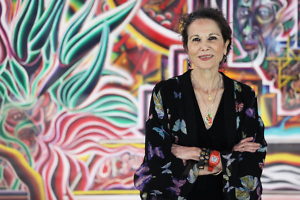
It’s familiar territory for Alvarez, an award-winning Dominican American author and a pioneer among Latina women writers in the U.S. In the 1990s, she helped pave the way for Latina writers to enter the literary mainstream with novels like How the García Girls Lost Their Accents and In the Time of the Butterflies. She is also the author of numerous books for young readers, as well as collections of poems and nonfiction. In 2013 she was awarded the National Medal of Arts by President Obama.
Julia Alvarez recently talked by phone with Chapter 16 in anticipation of her appearance at the 2020 Southern Festival of Books. The interview has been edited for length and clarity.
Chapter 16: I am delighted to talk to you, having first read your novel How the García Girls Lost Their Accents as an undergraduate in a course on Latina writers in the 1990s. It seems that now more than ever there is a new appreciation of your work and the work of your contemporaries like Sandra Cisneros and Gloria Anzaldúa.
Julia Alvarez: We came of age at the same time. Sandra Cisneros and I and that whole generation. I feel lucky to see this happen because when we got started no one was publishing us. It was a pre-multicultural world. My agent submitted García Girls to about 13-14 different publishers, and the one who gave me a chance was Algonquin Books of Chapel Hill. It was an unusual title for their list, so she was taking a chance with this kind of “ethnic literature,” which had always been considered sociological. The African American writers were instrumental in beginning to open it up. And Maxine Hong Kingston was at the vanguard and had won a bunch of awards. When García Girls was published [in 1990], I had been writing for over 20 years and it didn’t get published until I was 41.
Chapter 16: From the García girls to the Mirabal sisters of Butterflies and now the sisters of your new Afterlife, sisterhood — and in particular immigrant sisterhood — is a long-running theme of your work. Does this have anything to do with your own family history? Why the importance of female bonds in particular?
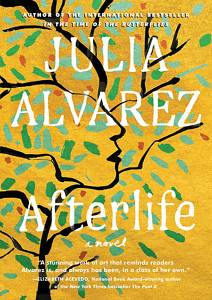 Alvarez: Yes, I am from a family of all girls. It also has to do with missing books on the shelf in terms of stories about Latinx and Latin Americans in English. When you think of the big names, Mario Vargas Llosa, Gabriel García Marquez, all of them were male. I am interested in those gaps, the stories that haven’t been told. The ones I wish I had had to read when I was coming up as a new reader. And with García Girls, I had read a lot of new novels, so many of them, and there weren’t many stories about the female immigrant story, what was it like for them. Because you know, they were under different kinds of pressures. They had that patriarchal family, Papi and Mami, who reined them in, and boyfriends, etc. I just missed that in the stories I was reading.
Alvarez: Yes, I am from a family of all girls. It also has to do with missing books on the shelf in terms of stories about Latinx and Latin Americans in English. When you think of the big names, Mario Vargas Llosa, Gabriel García Marquez, all of them were male. I am interested in those gaps, the stories that haven’t been told. The ones I wish I had had to read when I was coming up as a new reader. And with García Girls, I had read a lot of new novels, so many of them, and there weren’t many stories about the female immigrant story, what was it like for them. Because you know, they were under different kinds of pressures. They had that patriarchal family, Papi and Mami, who reined them in, and boyfriends, etc. I just missed that in the stories I was reading.
With Afterlife, I was really interested in the idea that now that we know about the Latina sisterhood, what is the aging story, as they get older, how would that play out? I was shocked when my publisher sent me the PR [for Afterlife] and said, “It has been 15 years since her last novel.” It took me this long because I didn’t want to keep repeating what I’d already done. I wanted to write from this stage of life, and I didn’t see that many books with older characters as the protagonists, especially older Latina characters, unless they were the airbrushed abuelita, you know? What would an older Latina woman not in that mold be, and what would their relationships be? I wanted to explore that territory of aging, of sisterhood, of Latina families as they scattered and made lives here. The kind of toll that takes on some of the certainties, the connections they had before that might have saved them from certain kinds of crises.
Chapter 16: The sisters have a strong bond with one another but they are also complicated, and there are crises and events that test those bonds. Antonia, recently retired and widowed, seems to struggle with her role in the group. It’s not an easy fit for her. I wondered if you see yourself in that role? Do you feel this stage of life is a time for you that is not always easy, and how does that change your relationships?
Alvarez: I think that sometimes, because we’re supposed to carry that banner of “we are familia,” and families are so important, that we don’t allow ourselves [a place] and we limit ourselves. So much is so good about our extended clans and familias, but there are also limitations. There are times when we are pushing up against the roles we are given, as happens in families. I wanted to explore that, too. I just tried to be accurate. I wanted to write about a character that is as complicated as the rest of us.
Diversity is not just a community thing. It’s an internal thing too — to allow our many selves. You can be Latina and you can be an activist, and on the other hand you want your own life. You want to be allowed the full complexity of being a human being.
Chapter 16: Politics and important historical events are essential background for much of your work. Afterlife is no different. Can you say a little more about how the times we are living in now informed this novel?
Alvarez: Well, one of the things that gives me shivers is how much it speaks to this moment, although I had no idea the pandemic was coming. I think that as writers, one of the things that we do is pick up a lot of things as part of an artistic sensibility. We writers pick up the zeitgeist — a feeling of the moment. I felt like we were living in elegiac times. By that I mean that we were seeing the end of so many things: climate change, species going extinct, huge storms caused by these environmental changes, coastal towns and impoverished countries finding themselves threatened with their coasts going under water, and also the end of a kind of civility. Divisiveness, gun violence, violence against communities of color — which I say is the pandemic that was already there — all of this is going on and I felt weighed down by all of that, and I felt like we were in a time of looking at so much loss. Loss on a wider scale, but also on a personal scale.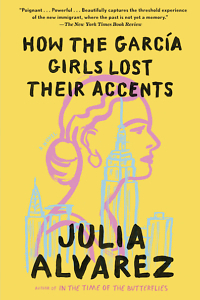
These great complicated Latina families, for example. My father was the youngest of 25 kids. The first wife had 10, then she died and [his father]married his first cousin and had 15 more! I come from a big clan. And it’s great and you get so much material, but what happens is when you start losing them, you lose a whole phalanx of people. They all start to go. It seemed like I was living so much loss. I wanted to write about a character who, at the moment when the world just falls apart, she has to figure out what [she] thought was [her] challenge, all of our challenge: How do we live in a broken world and not lose faith in each other or ourselves? How do we keep hope alive? How do we move forward in a way that is big-hearted and a larger version of ourselves?
And it can’t just be an easy fix. Antonia has to go through those dark moments, the questioning, those ambivalences that we all feel and experience, the full impact of what it means to live in these times but still not give in. “It would be unethical to despair” [as Antonia remembers someone saying during a lecture she attended on climate change]. It’s not fair to the new generations that are coming up. Because if we don’t do it, it won’t happen later unless we step in now.
Chapter 16: Antonia, a recently retired English professor, frequently uses literature as a way to access her own humanity as she quotes her favorite verses of poetry and the books she used to teach throughout the novel. It seems to me that art is what she turns to when she is out of other options. At one point, she is reminded that “we have to live as if, in other words by metaphor.” What does this mean for you? And how do you access creativity in the midst of so much doom?
Alvarez: I also want to challenge that. Antonia is always dependent on this little firewall of words and literature to protect her, to give meaning to moments that are terrible. But what happens when that breaks down? You build it up again. As in the epigraph of the book, [a quote from T.S. Eliot: “These fragments I have shored against my ruins”]. They’re fragments, but there’s a beauty to them that reminds us of what’s important. This is what I mean by living by metaphor. Martin Luther King used to say this, and John Lewis: You live as if it’s already happened. The world that you want to create, you live as if, and that is the world you are acting out of rather than reacting to the old paradigm that keeps you trapped within it. And that is the thing about literature, that it creates other paradigms. You get out of the historical moment you are a part of and the skies open and you see other possibilities. Making a leap of the imagination towards what is possible. As if it is already a reality. The minute you start being an activist for that world, you are creating it.
Chapter 16: I love that. It’s something so tangible, that in the world where we have so much to be hopeless about, that is a really strong sense of what we can do.
Alvarez: Yes, otherwise you’re trapped in that paradigm that someone else has created.
Chapter 16: Antonia has to be pulled back to reality when art and language no longer work for her.
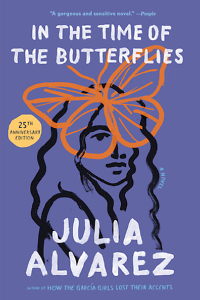 Alvarez: The stuff you hold onto [and that’s also why I titled the book Afterlife] — it’s not just that she has to keep alive certain things that she loved and the people she loved so that those things don’t die, but it’s also that if you live long enough you know that a life is full of many little deaths. You lose certain certainties. You lose being a child, you lose people you love, and if you’re lucky you come back from those little deaths to a kind of renewal. And hopefully, you come back incorporating all that you learned from that earlier life into this one. So, the things that she has garnered from being a lover of words and stories and how they can help her make meaning, that has to be tested and some certainties have to die. But when she comes back to it it’s a richer, fuller acceptance that goes with it. Not just academic or something she talks to her students about. And then it becomes integrated into a whole self.
Alvarez: The stuff you hold onto [and that’s also why I titled the book Afterlife] — it’s not just that she has to keep alive certain things that she loved and the people she loved so that those things don’t die, but it’s also that if you live long enough you know that a life is full of many little deaths. You lose certain certainties. You lose being a child, you lose people you love, and if you’re lucky you come back from those little deaths to a kind of renewal. And hopefully, you come back incorporating all that you learned from that earlier life into this one. So, the things that she has garnered from being a lover of words and stories and how they can help her make meaning, that has to be tested and some certainties have to die. But when she comes back to it it’s a richer, fuller acceptance that goes with it. Not just academic or something she talks to her students about. And then it becomes integrated into a whole self.
Chapter 16: At the end of the novel, the chapter entitled “Harvest,” Antonia quotes Matthew Arnold: “Wandering between two worlds, one dead, / The other powerless to be born …” What do you see as the world that’s waiting to be born? What hopes do you have for the one that we can create?
Alvarez: Well, I would be reluctant to … it’s like when people ask, “What is your book about?” The minute you start to predict it, you close down the element of discovery. And the element of community. Of figuring it out together. And you sort of begin to colonize the future with your own ideas. It’s so limited. You can’t do it by yourself. I guess what I would hope for are some of the things we’ve been talking about in the novel, of granting each other the full range of diversity. You can’t instantly label the Sheriff or Roger [characters in the novel] a redneck, for example. Their humanity comes through in surprising ways, and it surprises Antonia. I think that in order to build community, we have to widen our little labels and boxes in order to work together and try to bring about the systemic change that we all know needs to happen. And it needed to happen before now, but the pandemic has really brought it to the fore.
Some of the changes that Black Lives Matter and the #MeToo movements, and even the Latinx movement, have been talking about — equity in terms of income and opportunity, inclusiveness, a revision of education so it’s affordable, healthcare — all of those things would be a way to create a more compassionate community. And also to start something that I don’t see happening even with all the protests, which is that we need to come together not just as a country but as a global community. As borders close down and people accuse each other, [support] draconian immigration laws, etc., that [global community] isn’t happening. And it is hard for people who are undocumented, say, and already terrified of being found out to be activists. So, the rest of us have to pick up some of that.
I also feel that with a lot of the talk about racism and anti-racism, it’s a really important time to listen and not just promote a certain agenda. On my part, I feel like I am learning a lot. One of the sectors I am learning from is young people. They are so far ahead of where I was when I was their age. They really get it. And the protests recently, I feel amazed at this kind of awareness and courage. I want to listen and learn. We, my generation, took it as far as we could, but I have a lot to learn and I want to be there to help instead of lead and give answers. So that’s why I pulled back a little. I want to hear and support these young, vibrant people.
Chapter 16: How has the pandemic affected your writing and your routine?
Alvarez: I’ve been busier than ever! I was supposed to go on a three-week book tour with Afterlife and that was it. And because all of the book tours were canceled, they set up digital book tours and I’m still on it. I’ve been busier than I’ve ever been with Zooms and interviews and online festivals. The usual venues of promotion are lost now, so publishers have had to do other things to promote the books and it doesn’t feel right not to help them. But I feel like I’ve been so distracted. There is more time, but in some ways more distraction [with the internet and emails and texts], so you can’t get away from it.
Chapter 16: What writers are important to you now?
Alvarez: So many! So many exciting young writers. Like Kali Fajardo-Anstine and Jaquira Díaz. Ocean Vuong and Reyna Grande. Natalie Díaz, Ada Limón. And of course, while not as young, Edwidge Danticat. And lately I’ve been rereading Toni Morrison.

Joy Ramirez holds a Ph.D. in comparative literature. She taught Italian at Vanderbilt University and the Colorado College. She now writes and lives in East Nashville.
Tagged: 2020 Southern Festival of Books, Q&A
